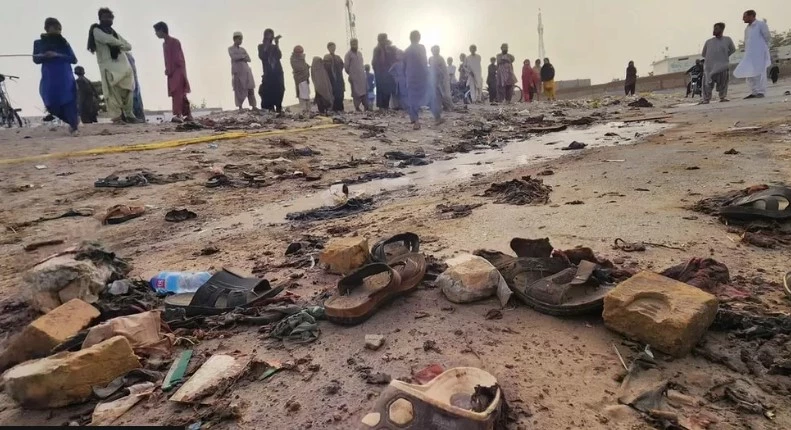Wave of terror attacks targets places of worship in Pakistan, resilience remains unshaken

Stay tuned with 24 News HD Android App

Pakistan finds itself engulfed in turmoil as a relentless wave of terrorist attacks targets places of worship belonging to diverse faiths, leaving behind a trail of devastating casualties and injuries.
Despite the heart-wrenching toll exacted by these heinous acts, the resilience of the nation remains unshaken, with its determination to confront both internal and external threats unyielding, extending to the very brink of existence.
The nation remained in a state of shock following the Jaranwala incident, where a deliberate desecration of the Holy Quran was carried out by a handful of individuals within the Christian community. This disturbing act was part of a well-orchestrated scheme aimed at stoking religious discord and fostering an atmosphere of fear and devastation, all with the sinister goal of tarnishing Pakistan's reputation on the international stage.
Regrettably, the architects behind this vile scheme achieved a degree of success in their hidden agenda. Some impassioned Muslims, oblivious to the manipulative tactics employed by the perpetrators, launched frenzied attacks on the homes and places of worship belonging to the Christian community, perpetuating an atmosphere of madness and chaos.
The commendable actions of faith leaders and government authorities played a pivotal role in restoring normalcy to the situation. Without their swift and effective response, the repercussions could have extended well beyond the national borders, potentially impacting international relations and perceptions.
Frustrated by their inability to incite interfaith discord, anti-state elements embarked on another sinister endeavor in Mastung. They planned a suicide attack on a rally held to commemorate the birthday of the Holy Prophet Muhammad, Peace Be Upon Him, with the ulterior motive of igniting intera-faith conflicts within society.
In the aftermath of this brutal incident, the Barelvi school of thought bore the heavy toll of loss, but they refrained from pointing fingers at any other religious sect for the tragedy. Instead, they steadfastly renewed their commitment to stand shoulder to shoulder with national security forces and institutions in the ongoing battle against terrorism.
During a keynote address at the Seerat-un-Nabi Conference, a gathering organized by the Ministry of Religious Affairs and Interfaith Harmony, Caretaker Minister for Interior Sarfraz Bugti shed light on two ominous agendas designed by Pakistan's adversaries. He said these nefarious schemes aimed to obliterate the nation from the global stage, encompassing economic crisis and the deliberate cultivation of ethnic divisions.
Minister Bugti emphasized that the promotion of religious violence was a deliberate tactic with an ultimate goal of inflicting damage upon the national economy.
In a firm and resolute statement, Pakistan Ulema Council Chairman, Hafiz Muhammad Tahir Mahmood Ashrafi, vehemently condemned the recent wave of terrorist attacks. He characterized those responsible for targeting innocent civilians as adversaries of both humanity and Pakistan itself, asserting their sinister agenda aimed at sowing discord and instability within the nation.
Ashrafi, who also holds the position of International Interfaith Harmony Council President, went on to make allegations of Indian involvement in acts of terrorism, not only within Pakistan but also in other countries, including Canada. He urged the international community to take decisive action against India to address this issue in a lasting and comprehensive manner.
In response to an inquiry concerning the forthcoming International Ministerial Conference on Freedom of Religion or Belief, slated to convene from November 28th to 30th in the Czech Republic, Ashrafi emphasized the imperative for faith-based organizations to adopt robust initiatives aimed at fostering interfaith cohesion on the global stage. Furthermore, he underscored the need to counteract reprehensible acts involving the desecration of religious sanctities and values, often cloaked under the pretext of freedom of speech or expression.
Upon reaching out to the Ministry of Foreign Affairs for verification regarding the attendance of the minister at the forthcoming international symposium on religious freedom in the Czech Republic, official sources conveyed that neither the minister nor any other government representative had been designated to partake in the event as of the current information available.
It is noteworthy that in addition to domestic faith-based organizations, foreign missions in Pakistan are actively striving to establish a shared platform for adherents of diverse religions to engage in meaningful interfaith discourse.
Peace and Justice Network (PJN) Executive Director Syed Raza Ali informed that the PJN, a provincial partner of the British Council's Aawaz II programme, recently convened a provincial dialogue aimed at deliberating on strategies to enhance interfaith harmony and bolster social cohesion within Punjab's local communities.
He mentioned that the event successfully assembled over 77 prominent stakeholders at the provincial level. These participants included representatives from Aawaz II Village and District Forums, as well as young members hailing from various religious minority communities. These communities spanned across 23 districts in Punjab, encompassing Hindus, Christians, and Sikhs.
Emphasizing the core objective driving this provincial dialogue, Raza articulated that its primary function was to establish a forum for amplifying the voices of non-Muslim communities, acknowledging grassroots success stories, and presenting actionable suggestions for civil society organizations, provincial authorities, and other vested parties. He expressed hope that these efforts would bolster their dedication to fostering a fairer and more inclusive society.
Note: The author of this news article boasts a distinguished career as a senior journalist and holds the esteemed position of president within the International Consortium for Religious Diplomacy. His extensive expertise in matters of faith has been honed through comprehensive coverage of religious events, spanning both national and international domains. The readers can reach him through email: rehan.khan@wnp.digital or cellular number: +92 300 5382730
